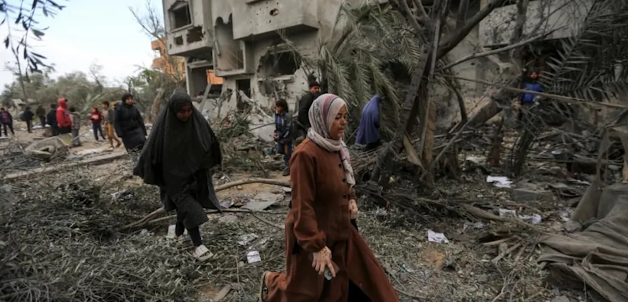This escalation follows Israel's resumption of its bombing campaign and ground operations in Gaza earlier this week, with airstrikes already resulting in over 430 deaths in the past two days, as reported by the health ministry. The Israel Defense Forces (IDF) stated on Thursday that it had commenced a ground operation in northern Gaza. There had been a lull in large-scale military action since January when a ceasefire began.
The health ministry in Gaza also reported that 133 people were injured in the latest attacks on Thursday. Israel resumed its military actions on Tuesday after talks to extend the ceasefire failed to progress, warning that attacks would intensify until Hamas released the remaining hostages. Israel claims that Hamas is still holding 59 hostages, 24 of whom are believed to be alive.
IDF spokesperson Colonel Avichay Adraee mentioned that Hamas had launched three rockets from southern Gaza, with one intercepted while the other two fell in an "open area." Earlier on Thursday, the Israeli military stated it had begun "targeted ground activities" to establish what it described as a "partial buffer between the north and south" in Gaza, referring to the operation as a "limited ground operation." Colonel Adraee indicated that forces had been deployed to the center of a region known as the Netzarim Corridor, which separates northern and southern Gaza.
Meanwhile, five staff members of the UN's Palestinian refugee agency, UNRWA, were reported among those killed in the "past few days," according to agency chief Philippe Lazzarini, who noted they were teachers, doctors, and nurses. He warned that "the worst is yet to come" amid the ground invasion. On Wednesday, the UN reported that one of its workers had been killed and five others injured after its compound in Deir al-Balah, central Gaza, sustained damage, with the circumstances remaining unclear. Gaza's health ministry blamed an Israeli strike for the incident, while Israel's military denied attacking the compound.
UK Foreign Secretary David Lammy confirmed on Thursday that a British national was wounded in the compound attack. This followed reports from a charity that a 51-year-old British bomb disposal expert had also been injured. "Our priority is supporting them and their family at this time," he told Members of Parliament.
Elsewhere, Yemen's Houthi rebels fired a ballistic missile at Israel on Thursday, targeting Ben Gurion Airport near Tel Aviv, according to the Iran-backed group's military spokesperson. No injuries were reported, and the IDF confirmed that the missile was intercepted before entering Israel.
On Tuesday, Israeli Prime Minister Benjamin Netanyahu stated that the country had "resumed combat in full force" and that any negotiations for a ceasefire would now take place "under fire." A group representing the families of hostages has accused the Israeli government of choosing to "give up the hostages" by initiating new strikes.
Israel and Hamas have been unable to agree on extending the ceasefire beyond its initial phase, which expired on March 1. Although Hamas did not agree to renegotiate the ceasefire on Israel's terms, it offered to release a living American hostage and the bodies of four other hostages while mediators attempted to maintain the ceasefire.
At the beginning of March, Israel blocked all food, fuel, and medical supplies from entering Gaza to exert pressure on Hamas, accusing it of commandeering provisions for its strategy against Israel, although it did not provide evidence to support this claim.
The conflict was triggered by Hamas's attack on Israel on October 7, 2023, which resulted in the deaths of approximately 1,200 people, primarily civilians, and the abduction of 251 others. During the first phase of the ceasefire, 25 Israeli and five Thai hostages were released alive. In response to the October attack, Israel launched a massive military offensive that reportedly resulted in over 48,500 Palestinian deaths, primarily civilians, before resuming its campaign, according to the Hamas-run health ministry. The offensive has also caused significant destruction to homes and infrastructure.




